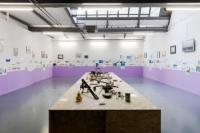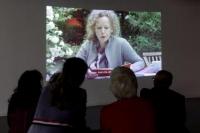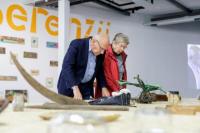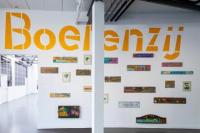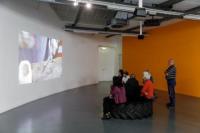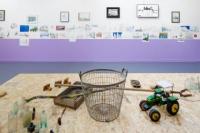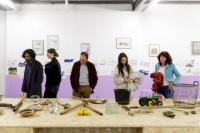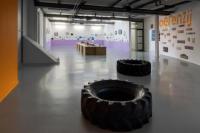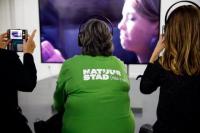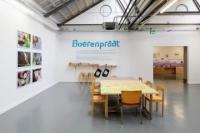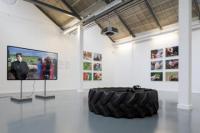TENT, Rotterdam NL (ENG)
A year of (private) events and an exhibition in TENT 10 October 2019 till 12 January 2020.
2019, Boerenzij (The Rural Side)
The Rural Side, is a project about rural culture with Rotterdammers. It questions the supposed contradiction between the countryside and the city that dominates not only popular perception but also urban and rural planning and politics.
The urban and the rural are inextricably interrelated, but the urban perspective dominates. We consider urbanisation and urban culture as synonymous with progress. From this perspective, the countryside and rural culture are always on the periphery, in the city’s shadow. Feenstra questions this preconception with on-location projects. Her latest enquiry is into Rotterdam’s ‘Boerenzij’ (Farmers’ side). The harbour city of Rotterdam was built by people who often came from elsewhere, mainly from the countryside. Feenstra connected with them to share knowledge and to recall memories, revealing how a rural mindset is present within urban space. The exhibition resulting from this exchange invites us to reimagine our perceptions of the city and the countryside.
The Rural Side is the nickname Rotterdammers north of the river gave to those from Rotterdam-South, implying they weren’t proper city dwellers. In the nineteenth and twentieth centuries, the harbour of Rotterdam annexed more and more south-of-the-river polders and villages, such as Charlois, Katendrecht and Feijenoord. The residents of this new district were rural labour migrants, initially from North Brabant, Zeeland and Southern Europe, and later from Morocco, Turkey, Suriname and the Antilles. These newcomers were implicitly expected to leave their rural culture and knowledge behind, just as local farmers were expected to relinquish fields to make way for the city. Feenstra, who is both a Rotterdammer and a farmer’s daughter, knows the countryside always stays with you. She wondered whether this also applies to other Rotterdam residents, and so she sought rural knowledge and culture in the city and ways to make it visible.
In a series of participatory activities over the past year, Feenstra invited residents of Rotterdam-South to help her shift preconceptions of the rural and the urban. Bottom-up approaches were central in this, acknowledging subjective and everyday forms of knowledge. With kale dinners, kitchen table discussions and visits to local farms, she brought people in contact with one another to exchange rural knowledge and memories of the countryside. In public drawing lessons on the wharfs and allotments, she invited residents to engage in slow looking – harking back to a tradition of ‘en plein-air’ landscape painting that was in vogue when industry and the harbour grew in order to record and reinterpret today’s changing urban landscape. More than a hundred residents and drawers participated.
A year of (private) events and an exhibition in TENT 10 October 2019 till 12 January 2020.
2019, Boerenzij (The Rural Side)
The Rural Side, is a project about rural culture with Rotterdammers. It questions the supposed contradiction between the countryside and the city that dominates not only popular perception but also urban and rural planning and politics.
The urban and the rural are inextricably interrelated, but the urban perspective dominates. We consider urbanisation and urban culture as synonymous with progress. From this perspective, the countryside and rural culture are always on the periphery, in the city’s shadow. Feenstra questions this preconception with on-location projects. Her latest enquiry is into Rotterdam’s ‘Boerenzij’ (Farmers’ side). The harbour city of Rotterdam was built by people who often came from elsewhere, mainly from the countryside. Feenstra connected with them to share knowledge and to recall memories, revealing how a rural mindset is present within urban space. The exhibition resulting from this exchange invites us to reimagine our perceptions of the city and the countryside.
The Rural Side is the nickname Rotterdammers north of the river gave to those from Rotterdam-South, implying they weren’t proper city dwellers. In the nineteenth and twentieth centuries, the harbour of Rotterdam annexed more and more south-of-the-river polders and villages, such as Charlois, Katendrecht and Feijenoord. The residents of this new district were rural labour migrants, initially from North Brabant, Zeeland and Southern Europe, and later from Morocco, Turkey, Suriname and the Antilles. These newcomers were implicitly expected to leave their rural culture and knowledge behind, just as local farmers were expected to relinquish fields to make way for the city. Feenstra, who is both a Rotterdammer and a farmer’s daughter, knows the countryside always stays with you. She wondered whether this also applies to other Rotterdam residents, and so she sought rural knowledge and culture in the city and ways to make it visible.
In a series of participatory activities over the past year, Feenstra invited residents of Rotterdam-South to help her shift preconceptions of the rural and the urban. Bottom-up approaches were central in this, acknowledging subjective and everyday forms of knowledge. With kale dinners, kitchen table discussions and visits to local farms, she brought people in contact with one another to exchange rural knowledge and memories of the countryside. In public drawing lessons on the wharfs and allotments, she invited residents to engage in slow looking – harking back to a tradition of ‘en plein-air’ landscape painting that was in vogue when industry and the harbour grew in order to record and reinterpret today’s changing urban landscape. More than a hundred residents and drawers participated.



